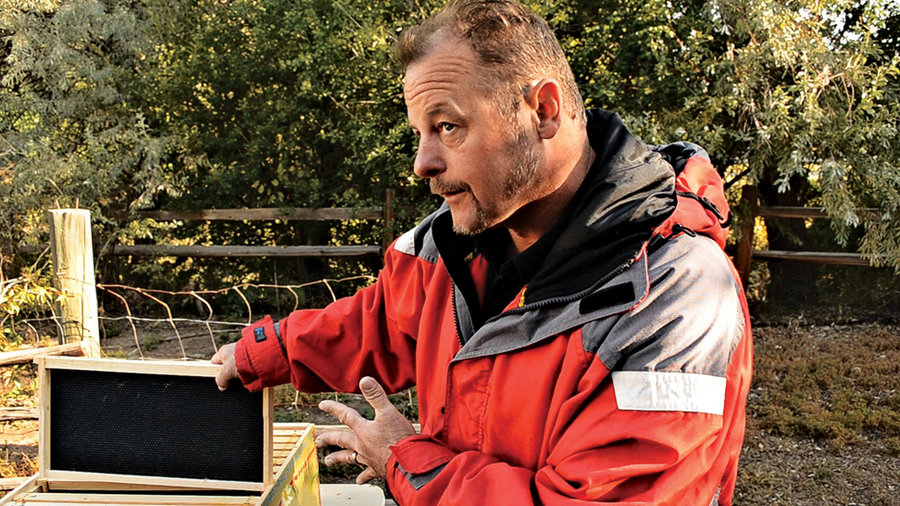Most people know if they are a dog person or a cat person, but what about a bee person?
A new documentary directed by Hoboken resident David Knappe explores the extraordinary characters who are drawn to man’s other best friend, the honey bee, including a well-known New York City detective known as “Tony Bees.”
At a time when thousands of bee colonies are mysteriously dying out, Knappe’s film argues that saving the crucial insects from a possible extinction could depend on regular people, even in densely urban areas like Hoboken, discovering the passion to become beekeepers.
Knappe’s film, “Bee People,” has been shown a number of times in Colorado, where its star and executive producer reside, but will debut on the big screen in Hudson County for the first time as part of the Golden Door Film Festival in Jersey City on Sept. 21. The film can also be purchased online at Amazon.com and in Whole Foods stores nationwide, and Knappe says he is in talks to get it picked up for cable on demand.
Meet the ‘Bee Guru’
The movie’s central figure is Gregg McMahan, the owner of Rocky Mountain Bee Removal, Rescue and Education in Thornton, Colorado. McMahon is a one-of-a-kind bee rescue specialist, beekeeping teacher, and proselytizer of all things bee. Knappe describes him as “one part Jack Nicholson, one part Elvis and 1,000 percent extreme beekeeper.”
The documentary is built around three weeks Knappe and executive producer Leslie Ellis spent with McMahan.
“We just go on a series of adventures with him,” said Knappe, including a rescue of 50,000 wild bees from the walls of a barn in rural Colorado.
Knappe ended up shooting 60 hours of footage with McMahan, and said every minute was a breeze.
“When we shot the material for ‘Bee People’ and I said, ‘Greg, action,’ that’s the last thing I had to do.”
“He was absolutely comfortable in talking about a subject he knows extremely well.” added Knappe. “He’s not shy at all. He calls himself ‘The Bee Guru.’”
The film’s adventures include a trip to Queens, where McMahan meets up with Anthony “Tony Bees” Planakis, who just recently retired as a detective for the New York City Police Department. Planakis was responsible for removing the beehives found in apartments and buildings around the city.
The film also includes Knappe and Ellis testing people on the street in Hoboken on their bee-related knowledge, with hilarious results. The scene can be found at vimeo.com/m/56118965.
Counteracting the collapse
Unfortunately for McMahan and Planakis, their way of life in currently in danger. Starting in 2006, large numbers of bees began disappearing from their hives in Europe and North America, with commercial beekeepers reporting losses of up to 70 percent of hives.
The phenomenon has a name – colony collapse disorder – but as of yet, no crystal clear cause. According to Knappe, there are three main suspected culprits: nicotine-based pesticides that make the bees drunkenly lose their way and die, tiny parasitic Varroa mites that attack the bees, or an as-yet-undetermined virus.
What scientists do know is that a full extinction of bees would be devastating for ecological diversity. In addition to producing honey, bees pollinate roughly one third of the world’s crops.
Knappe’s choice to name the movie “Bee People” was intentional in more ways than one. It is his belief, and the belief of McMahan, that humanity’s best chance of saving the bee lies in growing the community of hive-minded amateur enthusiasts who keep their own bees.
This focus on solutions sets Knappe’s film apart from recent bee documentaries like “More Than Honey” and “Vanishing of the Bees,” which do a good job of illustrating the dangers of Colony Collapse Disorder but spend less time on how it can be solved.
According to McMahan, the typical range of a honey bee is two miles. Just one additional hive within this distance from a foraging bee’s home nest would allow pollen-carriers to rest during their month-long, breakneck foraging season.
“It will be the urban beekeeper who saves the bees,” said McMahan in the film. He said 600 new beekeepers with one hive would help much more than one new beekeeper with 600 hives.
“The major crux of this film is that you too can be a bee person,” said Knappe. “Rooftop beekeeping is something that is relatively easy to do.”
City bees
Knappe said he didn’t know of any beekeeping operations in Hoboken, but a recent Hudson Reporter story noted successful hives in North Bergen, Secaucus, and Jersey City. The waterfront Hyatt Regency in Jersey City boasts four hives on its roof.
Beekeeping is definitely possible in a city as dense as Hoboken, but not for every resident. The Best Management Practices for beekeepers in populated areas developed by the New Jersey Department of Agriculture advise against placing bee colonies less than 25 feet from a public sidewalk or street. If hives are within 10 feet of a property line, they must be surrounded by a flyway barrier that forces the bees to cross the property line at a height of 6 feet.
New Jersey bee law requires all beekeeping operations to be registered annually with the state so they can be inspected. If diseased bees are found by an inspection, the infected colonies must be quarantined and treated under threat of fine.
“Bee People” will be screened at 2 p.m. on Sunday, Sept. 21 at the Landmark Loew’s Jersey Theatre on Journal Square in Jersey City as part of the “Birds and the Bees Doc Block” at the Golden Door Film Festival. Tickets are $10 and can be purchased online in advance at www.brownpapertickets.com/event/854905.
Carlo Davis may be reached at cdavis@hudsonreporter.com.
